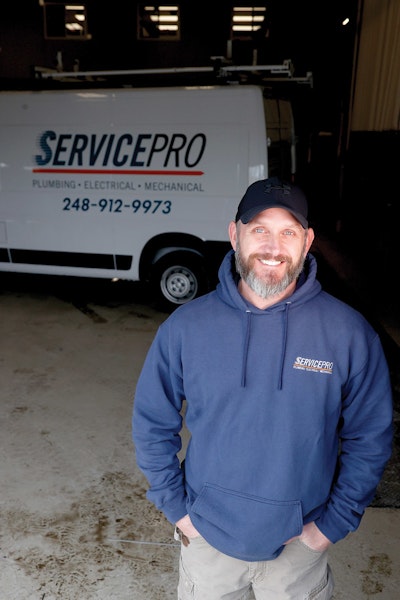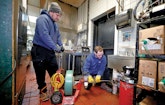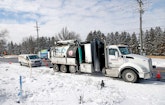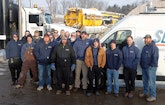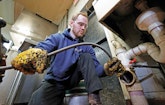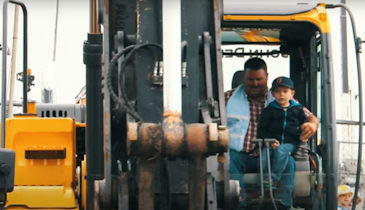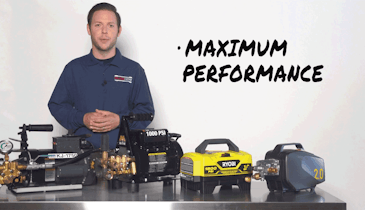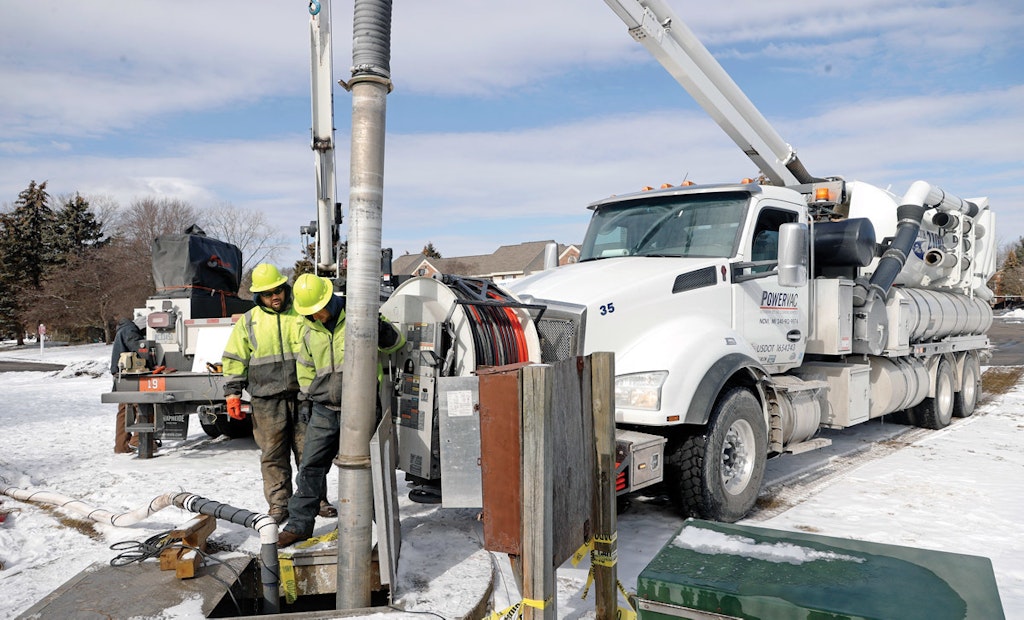
PowerVac technicians Matt Sampson (left) and Andrew Waszkiewicz pump out a storm drain at an apartment complex.
Interested in Cleaning?
Get Cleaning articles, news and videos right in your inbox! Sign up now.
Cleaning + Get AlertsFrom its roots as a one-employee operation, PowerVac has morphed into a large company with different divisions serving multiple markets and employing more than 100 people.
At any given time these days, the company field technicians might be scouring a large-diameter induction furnace and descaling pipes at a metallurgical products manufacturer; removing a defective commercial boiler and installing a new one; inspecting and cleaning lines in a major hospital’s sanitary sewer system; removing debris from catch basins for a local municipality; potholing underground utility and fiber-optic lines for a natural gas utility; or pumping out grease traps.
In fact, the company — based in Novi, Michigan, about 30 miles northwest of downtown Detroit — eventually became so big that it required additional capital and managerial resources. So in 2019, the company took on two private equity partners, with founder David Janks remaining on board as PowerVac’s chief executive officer.
So how did the company evolve from a one-man band, with Janks basically working out of the trunk of his car, into a multimillion-dollar-a-year company that does virtually everything its customers need, including plumbing, mechanical and electrical work?
The transformation essentially boils down to a four-pronged strategy: Provide a variety of services in order to become an invaluable one-stop shop for customers. Invest in productivity- and profitability-enhancing equipment and technology. Make strategic acquisitions that provide additional entry into new markets. And treat every customer’s problem as a top priority, every day, says Jon Korotko, field superintendent at PowerVac.
Quick response
“It’s all about keeping customers happy — really appreciating and knowing that when they call, their world is upside-down,” says Korotko, who also is a master plumber, a certified camera technician and a department manager at ServicePro, one of the company’s service divisions.
“So we want to be able to address everyone as the most important customer of the day. It’s a challenge, but we pride ourselves on doing it for all of our customers, big or small.”
The company ups the ante on that service philosophy by guaranteeing its customers a 90-minute response time. That forces the company to be nimble and flexible, as well as ensure sufficient levels of staffing and equipment.
“Sometimes when we show up within 90 minutes, customers ask us if work is slow,” Korotko says. “But the fact is we work in controlled chaos; we’re very good at manipulating our schedules to accommodate customers.
“We’re a can-do company with a strong boots-on-the-ground mentality. Even though we’ve become a large company, we still truly care about our customers. We always want to be able to fulfill their needs.”
Humble roots
A chemical engineer by trade, Janks established the company in 2002. Organic growth followed as one service led to another and another.
Initially, he sold chemicals and an injection system designed to break down grease particles and prevent them from solidifying. Then, in a portend of things to come, he diversified by cleaning grease traps inside restaurants, too — by hand, Korotko says.
An astute entrepreneur, Janks then saw an unfilled market niche: cleaning much larger exterior grease traps. That prompted him to invest in a combination sewer truck. That, in turn, opened the door to even more business from other customers that needed vacuum services, such as grocery store chains, hospitals and school districts.
Along the way, Janks also established plumbing, electrical and mechanical divisions under the ServicePro brand name to become even more of a one-stop shop for customers attracted by the convenience this business model provides. Each of these additional services was established through acquisitions of smaller mom-and-pop shops in the various trades.
Organic growth
Later, Janks acquired a small vacuum-services company that did work for one of the state’s largest electric utilities. That led to providing hydroexcavation and vacuum services for other utilities, which now is one of the company’s core markets and revenue generators.
“The growth was rather amazing,” Korotko says. “And a lot of it came about by being a one-stop shop.
“That always was the big goal. You clean a catch basin, for instance, and find out it’s failing. So you can bring in your plumbers, who are trained to rebuild them. We do jobs from start to finish, without the delays that often come from using subcontractors.”
PowerVac also works for other contractors that can’t do certain jobs because the work requires significant investments in specialized equipment. A good example is hydroexcavation trucks, which can cost around $450,000 — a price tag that can stand as a barrier to market entry, Korotko says.
As an example of a specialized job, Korotko cites an instance about six years ago when two lift station pumps failed at a veterans’ hospital in downtown Detroit. The pumps had to be removed, rebuilt and reinstalled, leaving the hospital with a potentially disastrous problem: no sewage-treatment service.
So PowerVac brought in multiple vacuum trucks to handle the flow of sewage discharge from the hospital, something few contractors are equipped to do, he points out.
“We had about four Vactor trucks working around the clock for two weeks. When the pit was full, we’d suck it empty. And when a truck was full, we always had another one on standby to take its place.”
PowerVac tends to specialize in niche installation or repair projects — difficult scenarios that either are too small for large companies to handle or too big for small companies, Korotko explains.
“We’re the company that other companies call when they struggle to resolve issues. We’re the kind of company that never says, ‘No, we can’t do that.’ We always figure out a way to handle customers’ problems.”
Capital investments
Providing so many services requires a sizeable fleet of equipment.
“When there’s a need for it, we don’t hold back,” Korotko says. “We have to keep up with our customers’ needs and wants, so we have to keep investing in equipment.
“If you don’t have the equipment, you can’t do the work. It’s just that simple. And it’s been a very successful approach, especially with our 90-minute response guarantee, which helps keep us in business and on our toes.
“We’re always one phone call away from the day’s schedule totally changing, yet we still have to maintain the current jobs. We wouldn’t be able to do that if we didn’t continually reinvest in equipment.”
To get jobs done, PowerVac owns 15 Vactor combination sewer trucks, which feature 10- to 15-cubic-yard debris boxes, 2,500-gallon water tanks and blowers built by Roots (a brand owned by Howden).
The company also has invested in eight Vactor HXX hydroexcavating trucks, equipped with 15-cubic-yard debris boxes, 1,200-gallon water tanks and blowers from Roots and Hibon (a division of Ingersoll Rand); and one Guzzler hydroexcavating truck, featuring a 12-cubic-yard debris box, two 300-gallon water tanks and a Hibon blower. They’re primarily used for exposing underground pipelines for utilities as well as for cleaning catch basins, sewer lines for commercial businesses, schools, hospitals and housing complexes, to name a few.
“We also clean process pipes, waste collection pits and wastewater treatment systems for facilities,” Korotko adds.
The vac trucks use jetting nozzles from KEG Technologies, Enz USA and Hydra-Flex.
The company’s equipment roster also includes a Spartan Warrior trailer-mounted jetter (4,000 psi at 18 gpm); push cameras from Envirosight, MyTana and Hathorn; one Envirosight Jetscan camera; an Envirosight pole camera; and mainline crawler cameras made by RST Technologies and Envirosight.
The company also relies on technology like the Service Trade mobile app, a cloud-based platform that creates digital work orders, invoices and records. It also puts customer work histories at technicians’ fingertips and allows them to add digital notes and photos to those histories, Korotko says.
“It takes a lot of the guesswork out of things and makes us much more efficient.”
Employee retention
Investments in new equipment also serve as a technician-retention too. And so does the wide variety of work technicians do, Korotko says.
“We’re a very unique company to work for — there’s nothing cookie-cutter about what we do,” he explains. “We’re not out there stamping bumpers, doing the same tasks over and over, day in and day out.
“Technicians often work for the same customers, but it can be a different scenario each time. They’re not just out there snaking drains. Plumbers are out there working with electricians to replace broken pumps and pump controls.
“Every day offers a little different view of the infrastructure world. If water runs through, in or around something, we service it. So there’s a lot of variety.”
Looking ahead, Korotko envisions following a similar path to the one that’s made PowerVac so successful: substantial yet controlled growth that enables the company to still maintain quality control and provide great customer service.
The company also could expand into regions outside of just southeastern Michigan, he says.
“I see our future growth as constantly evolving. We’re not going to tap on the brakes any time soon.
“We all know that our infrastructure is crumbling. Most of it was installed before World War II, so it’s in great need of maintenance or replacement. And when it fails, our customers’ businesses stop.
“And it’s our job to keep them open — keep those businesses in business.”
